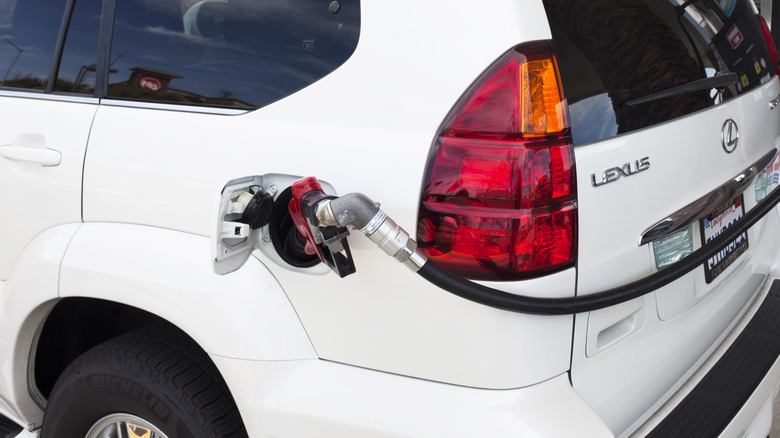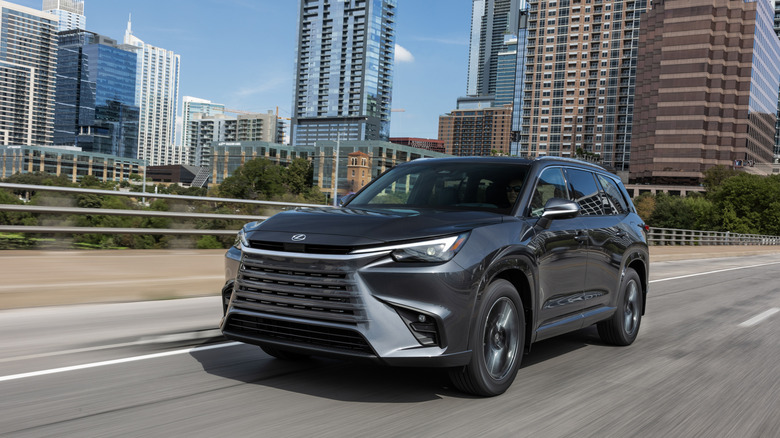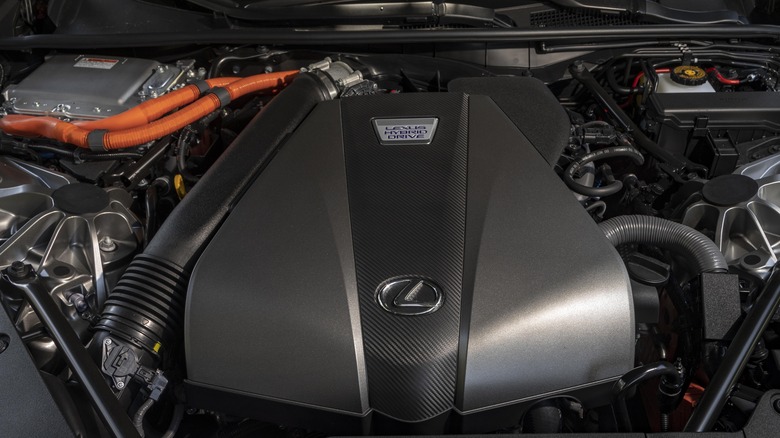Why Some Lexus Models Use Regular Gas, But Others Require Premium
Many people aren't aware that the Lexus brand is a division of Toyota. That may come as a surprise since Toyota has a reputation of being budget-friendly, while the Lexus name is associated with expensive high-end luxury. That connection between Lexus and luxury may also lead to the assumption that all Lexus vehicles require premium, high-octane gasoline. After all, Lexuses are expensive cars, so it follows that they would need expensive fuel. However, there are plenty of Lexus models that can run on regular gasoline, and they're not exactly cheap. As it turns out, the price of a car doesn't necessarily correlate to the type of fuel it requires.
In 2024, Lexus published an official comprehensive list of the recommended fuel rating for every Lexus model between the 1992 and 2024 model years. Most of the models in the 2024 lineup require premium fuel, including the TX series, the LS series, and all but one of the NX models. However, a few of the most popular 2024 Lexuses take regular, 87-octane gasoline. These include the ES series and hybrids like the UX300h, which packs a driving surprise. Another example is the NX250, which is the only model from the 2024 NX line that requires regular 87-octane gasoline.
The reason some models take regular and others take premium boils down to the compression ratio of their engines. Models tuned with high compression ratios require high-octane fuel that won't prematurely ignite and damage the engine. Other factors also affect a manufacturer's fuel recommendation, like turbocharging and susceptibility to engine knocking.
How compression determines fuel type recommendations
Engines are manufactured with specific compression ratios. The compression ratio of an engine is simply the maximum volume of one of the engine's cylinders divided by its minimum volume. In other words, it's a way of measuring how much the piston in a cylinder compresses the fuel-air mixture during a single four-stroke cycle. In engines with relatively higher compression ratios, the fuel-air mixture is compressed to a relatively higher pressure. And because pressure and temperature are directly related, those higher pressures result in higher temperatures. For folks who want more power and efficiency in their engines, those higher temperatures can deliver the goods.
But there's one problem with the high temperatures that high compression ratios generate: They can ignite the fuel-air mixture prematurely. Premature combustion occurs when fuel detonates spontaneously within the engine cylinder before the piston completes a full cycle. This causes engine knocking, which can cause irreparable damage to the engine over time.
Fortunately for Lexus owners with high-compression-ratio engines, high-octane fuel solves the problem of premature combustion. High-octane gasoline with a rating of 91 or higher resists premature combustion (or "detonation") better than low-octane gasoline. This is because its ignition temperature is higher. Premium gas doesn't actually burn hotter or better — that idea is a myth. Thus, Lexus models that require premium gas typically have higher compression ratios compared to those that require regular. It should be noted, however, that the electronics control unit in modern cars can detect knocking and adjust the compression ratio accordingly. Therefore, Lexus will often recommend premium for its high-end models simply to ensure the engine performs at its best, even when the car in question could theoretically adapt to a lower-grade fuel.
How turbochargers affect fuel grade recommendations
Different Lexus models use different engine systems, which are tuned to different compression ratios. This is the biggest reason some require regular gas while others require premium, but it's not the only one. There are always exceptions to the rule. One example in which compression ratios don't directly correspond to octane-rating recommendations can be found in the 2025 Lexus NX series. The 2025 NX250 has a compression ratio of 13.0:1, while the NX350 has a compression ratio of 11.0:1. The NX250 with its higher compression ratio takes regular gas, while the NX350 with its lower compression ratio requires premium gasoline. What's the deal? The answer is that the NX350 engine has a turbocharger while the NX250 engine doesn't. Most turbocharged engines require high-octane fuel, and Lexus models are no exception.
Turbocharged cars require premium fuel for the same reason that engines with high compression ratios do. The way turbochargers work is a bit complicated, but on a basic level, they force more air into the cylinder to increase the pressure. And just like with higher compression ratios, that extra "turbocharged" pressure increases the temperature of the fuel-air mixture in turn.
Thus, although the NX350 has a lower compression ratio than its regular-gasoline NX250 cousin, it still needs high-octane fuel to avoid premature fuel combustion since the pressure and temperature in its cylinders get "turbocharged." There are plenty of Lexus vehicles with relatively low compression ratios that still require premium fuel, and the reason is almost always the turbocharger.


